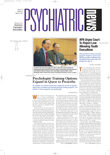American soldiers and Marines engaged in ground combat operations in Iraq last year developed more mental health problems than soldiers on the ground in Afghanistan in 2002.
The study, published in the July New England Journal of Medicine, is the first to examine the mental health status of soldiers returning from combat operations in Iraq and Afghanistan.
The military researchers surveyed about 6,000 U.S. Army soldiers and Marines anonymously last year. Lead author Charles Hoge, M.D., told Psychiatric News, “We surveyed three Army and Marine units three months after they returned from Iraq and Afghanistan and one large Army unit one week before deployment to Iraq in January.”
Hoge is chief of psychiatry and behavioral sciences at Walter Reed Army Institute of Research in Washington, D.C. “This is a longitudinal study in which we track soldiers through assigning numbers since we can't use their names,” said Hoge.
The Army researchers are taking a proactive approach to identifying mental health problems in returning soldiers from Iraq in particular. “We learned only years after soldiers returned from Vietnam that many of them had posttraumatic stress disorder [PTSD], which delayed treatment,” said Hoge and his colleagues at Walter Reed.
They used standardized checklists to screen the soldiers for the presence of PTSD, major depression, and generalized anxiety. Two screening definitions were used for each disorder.
Both definitions used the DSM-IV symptom criteria, but the broad definition excluded criteria for functional impairment, while the strict definition “required a self-report of substantial functional impairment or a large number of symptoms,” according to Hoge and his colleagues.
The percentage of soldiers who met the strict screening definition for major depression, generalized anxiety, or PTSD was significantly higher after duty in Iraq (17 percent) than after duty in Afghanistan (11 percent) or before duty in Iraq (9 percent), the researchers reported.
The researchers found that combat exposure was related to the presence of psychiatric disorders. The highest rates of disorders were among the 1,700 Army infantry soldiers and Marines whose tour of duty started with the U.S.-led invasion of Iraq on March 20 and ended six to eight months later.
This group of soldiers reported engaging in heavy combat during the invasion, more frequent combat, and more frequent contact with the enemy than soldiers who returned from Afghanistan.
Rates of PTSD were significantly higher after combat duty in Iraq than before deployment. PTSD was highest in soldiers who had been shot at, handled dead bodies, killed enemy combatants, or knew someone who had been killed, Hoge and his colleagues reported.
When mental health care was offered to the respondents with functional impairment or the greatest number of symptoms, only about 40 percent were interested in seeking help, and only about 30 percent reported receiving help in the preceding year, the researchers stated.
Stigma and concerns about confidentiality were the main barriers to seeking mental health care, the authors reported.
Hoge commented that military clinicians have an obligation to maintain patient confidentiality but, unlike their civilian counterparts, are also responsible for assessing a soldiers' fitness for duty. “If a soldier is severely impaired and can't safely operate highly technical weapons or equipment, that is a compelling reason to notify his commander,” said Hoge.
He emphasized that most soldiers who receive mental health care function well with medication and support.
Hoge and his research team briefed military leaders last year on the results and recommendations of the study. The recommendation to provide confidential counseling sessions through employee-assistance programs was implemented last fall, Hoge said.
The researchers also recommended that screening for PTSD be implemented in military primary care settings, where soldiers are usually screened for depression. ▪
